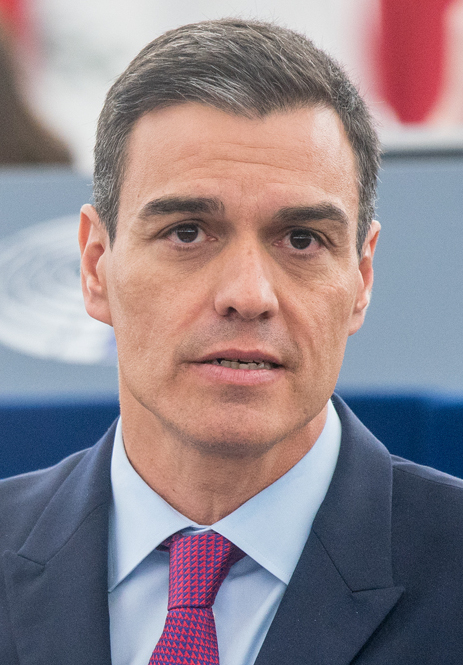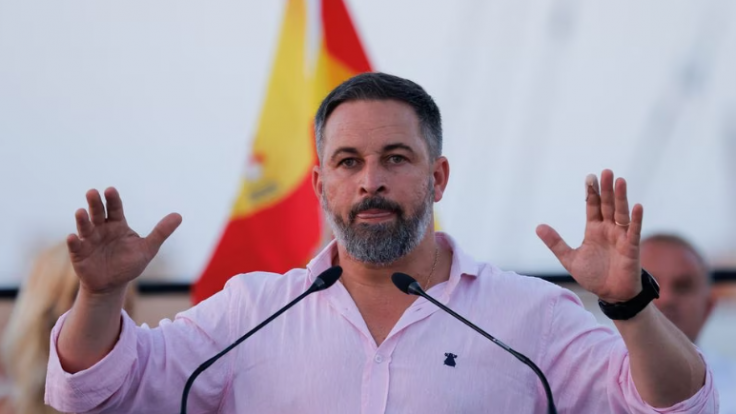Voters in Spain are heading to the polls on Sunday to decide the fate of the Socialist Prime Minister Pedro Sanchez, who called for a snap election after suffering a shock setback in regional elections earlier this year.
The latest opinion polls show that the right-wing Popular Party (PP) is set to unseat Sanchez's Socialists as the largest party in Spain's 350-member lower house of the parliament. However, the PP, led by Alberto Nunez Feijoo, is heavily unlikely to garner enough seats to form a government on its own. This opens the way for the far-right Vox party to gain a toehold in the government, as it is expected to win about 10 percent of the seats in Spain's Congress.

Rise of Vox
Leading Spanish newspaper El Pais, making the final compilation of opinion polls, said on Friday that there is a 55 percent chance that the PP and Vox together can form a coalition government. However, there is no pre-election pact between the two parties, and PP has gone as far as to suggest that Vox will not be in the government if it gets a majority on its own.
If indeed the PP falls short of a majority and Vox is called in for support, Spain will see a far-right party becoming part of the government for the first time since 1975.
In normal course, Spain's next general election would have been held in 2024, but Sanchez called for early elections after his ruling coalition PSOE suffered stinging defeats in regional and local elections held in May. The PP criticized the move to hold early elections, saying that the unusually hot summer will drive voters away from the polling booths.

Even as the straws in the wind suggest the return of the right-wing to the seat of power in Madrid, Sanchez has refused to give in, saying opinion polls can go wrong. "I see the Popular Party as running out of steam while the Socialists are making a comeback," Sanchez said on Friday.
Sanchez believes that Spain's relatively stronger economy is the highlight of his four years in power and has made his government's performance on this front the central campaign plank. He underscores the fact that Spain's GDP and inflation numbers are better than those of most of the economies in the EU region.
Opinion Polls
According to a poll of polls compiled by the El Pais, the conservative Popular Party is likely to win around 142 seats in the 350-member house. The Socialists are likely to win around 108 seats. The PP will need at least 30 more seats to form a government, making the far-right Vox a key player in the post-election scenario. According to the latest projections, Vox is likely to win at least 35 seats.

At the other end of the spectrum, the ultra-left Sumar is also poised to win at least 34 seats. The Sumar is led by Yolanda Diaz, who currently serves as the Labor Minister in Sanchez's cabinet.
Even as most of the opinion polls show that the PP and Vox will be able to form a coalition government, some polls show that they may fall short of the majority. This view is supported by some political observers who conclude that both the PP and Vox have lost some steam in the final days of the campaign.

Vox, which is led by Santiago Abascal, expects to lose some of the seats it holds in the current parliament but hopes to play a crucial role in the post-election dynamics. Abascal helped found the party in 2013 after breaking away from the PP. The party, which has adopted a hard-line stance on issues ranging from immigration to climate change, is the third biggest political party in Spain with 52 parliamentary seats.
If the right-wing coalition fails to reach the simple majority, Sanchez will be better placed to form the government as there are a clutch of smaller left-leaning parties that will come around to supporting him in order to stop the right-wing in its tracks.
Beyond the 'Big Four'
The Socialists, PP, Vox and Sumar are the 'big four' that have hogged the limelight in this campaign, but opinion polls suggest that a number of smaller parties are on track to get a combined 30 seats in the parliament.
These seats will be gobbled up by fringe players like BNG, PNV, ERC, Bildu, Coalición Canaria, Unión del Pueblo Navarro and Teruel Existe. If neither the Socialist-Sumar alliance nor a putative PP-Vox combine wins an outright majority, these parties will have a key role. Some of these parties, such as BNG, PNV, ERC, had earlier supported Sanchez after the 2019 election, and they may do so again this time to cast the right-wing away from power.
Sanchez is also likely to get the support of Junts and CUP, which are smaller outfits that champion Catalan independence. Basque separatist party Bildu is also likely to support Sanchez as the prime minister softened the stance on the party and entered into a pact with it recently.
On the other side, if the PP-Vox alliance falls short of the majority at a close range, parties like Coalición Canaria, Unión del Pueblo Navarro and Teruel Existe are more than likely to lend a helping hand.
When Will Results Come?
The polling will start at 9am local time on Sunday and the booths will close at 8pm. As many as 37.4 million Spaniards are eligible to vote in the national election. Some 2.3 million voters have already used the postal voting option, and there are 1.6 million first-time voters.
The earliest hints to the outcome of the election will come shortly after the polls close, when media outlets release the results of their exit polls. By midnight on Sunday, a rather clear picture of the final verdict will emerge.









